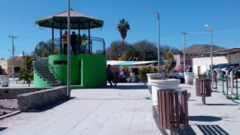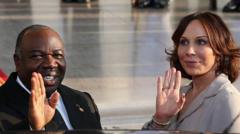The death of Pope Francis has left a complex legacy in Argentina, where feelings of pride clash with disappointment over his failure to return home.
**Pope Francis' Death Sparks Mixed Emotions and Reflection in Argentina**

**Pope Francis' Death Sparks Mixed Emotions and Reflection in Argentina**
Argentines navigate their grief as they reconcile their admiration for the late pope with critiques of his absence.
The recent passing of Pope Francis has ignited a wave of emotional responses across Argentina, as many grapple with feelings of loss and reflection on the pontiff's impact. Jorge Mario Bergoglio, who ascended to the papacy in 2013, is particularly mourned in his home country, where he is seen as both a figure of national pride and a person who, in some ways, became distant from his roots.
The Archbishop of Buenos Aires, Jorge Ignacio García Cuerva, encapsulated the sentiment of many Argentines, stating that Francis’ elevation to Pope left some feeling “orphaned” as he took on the mantle of leadership for the global Church. During a vigil at the Buenos Aires cathedral, many expressed their deep admiration for Francis's simplicity and compassion, qualities that resonated with many, despite the challenges he faced in maintaining connections to his native land.
Historically, Bergoglio's selection was unexpected; at 76 years old, many viewed him as retired, prepared to pass on leadership. However, his twelve-year tenure was marked by significant events, leading to a profound sense of loss following his death, prompting a national mourning period in Argentina.
While many herald him as a transformative figure, the pope's never returning to Argentina during his papacy has raised eyebrows and questions. His commitment to the global Church often seemed to overshadow his desire to engage with his fellow compatriots. Interestingly, Francis continued to follow Argentine affairs closely, commenting on cultural touchstones like soccer and tango, indicating a lingering attachment despite the geographical distance.
Dissatisfaction among some Argentines grew over the years. Initially, a staggering 91% viewed his papacy positively in 2013, a number that fell to 64% by 2024, reflecting a disillusionment among certain sectors. Critics accused Francis of failing to adequately confront Argentina's military dictatorship and questioned his political alignments, particularly concerning his perceived links to the leftist populist legacy of Peronism.
His later hours saw evolving political dialogues, as Argentina underwent a severe economic crisis, heightening the desire for his spiritual guidance. The current president, Javier Milei, while once critical of Francis, acknowledged his wisdom and extended an invitation posthumously, revealing the complex relationship politics has had with the pontiff’s legacy.
As Argentines mourn, many find solace in reminiscing about the pope’s continued presence through his prayers and global outreach. Alejandra Castro, a social worker among the mourners, articulated this connection, asserting that "in his heart, Argentina was always present." Yet discussions on how to reconcile the divide between differing opinions about his legacy reveal an introspective moment for many. Some argue for a critical reflection on societal splits, prompting a dialogue on how the nation perhaps could better welcome its renowned son.
Ultimately, Pope Francis leaves behind a multifaceted legacy that Argentinian society now reflects upon. In navigating their feelings of grief and pride, Argentines are poised to confront their narrative about one of the Church's most celebrated figures.
The Archbishop of Buenos Aires, Jorge Ignacio García Cuerva, encapsulated the sentiment of many Argentines, stating that Francis’ elevation to Pope left some feeling “orphaned” as he took on the mantle of leadership for the global Church. During a vigil at the Buenos Aires cathedral, many expressed their deep admiration for Francis's simplicity and compassion, qualities that resonated with many, despite the challenges he faced in maintaining connections to his native land.
Historically, Bergoglio's selection was unexpected; at 76 years old, many viewed him as retired, prepared to pass on leadership. However, his twelve-year tenure was marked by significant events, leading to a profound sense of loss following his death, prompting a national mourning period in Argentina.
While many herald him as a transformative figure, the pope's never returning to Argentina during his papacy has raised eyebrows and questions. His commitment to the global Church often seemed to overshadow his desire to engage with his fellow compatriots. Interestingly, Francis continued to follow Argentine affairs closely, commenting on cultural touchstones like soccer and tango, indicating a lingering attachment despite the geographical distance.
Dissatisfaction among some Argentines grew over the years. Initially, a staggering 91% viewed his papacy positively in 2013, a number that fell to 64% by 2024, reflecting a disillusionment among certain sectors. Critics accused Francis of failing to adequately confront Argentina's military dictatorship and questioned his political alignments, particularly concerning his perceived links to the leftist populist legacy of Peronism.
His later hours saw evolving political dialogues, as Argentina underwent a severe economic crisis, heightening the desire for his spiritual guidance. The current president, Javier Milei, while once critical of Francis, acknowledged his wisdom and extended an invitation posthumously, revealing the complex relationship politics has had with the pontiff’s legacy.
As Argentines mourn, many find solace in reminiscing about the pope’s continued presence through his prayers and global outreach. Alejandra Castro, a social worker among the mourners, articulated this connection, asserting that "in his heart, Argentina was always present." Yet discussions on how to reconcile the divide between differing opinions about his legacy reveal an introspective moment for many. Some argue for a critical reflection on societal splits, prompting a dialogue on how the nation perhaps could better welcome its renowned son.
Ultimately, Pope Francis leaves behind a multifaceted legacy that Argentinian society now reflects upon. In navigating their feelings of grief and pride, Argentines are poised to confront their narrative about one of the Church's most celebrated figures.






















